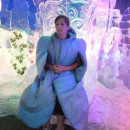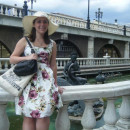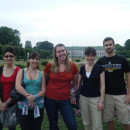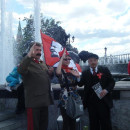From Russia with Love: An Amazing Summer in Moscow! Past Review
By Kristin S (Political Science/International Affairs, Southern Illinois University - Carbondale) for
Moscow University for the Humanities: Moscow - GRINT Center for Education and Culture, Direct Enrollment
I've loved Russia for years now, and living in Moscow for two months just solidified that. I love Russian culture and the Russian people, and the country just has so much history and culture--it is awe-inspiring. Winston Churchill once described Russia as "a riddle wrapped in a mystery inside an enigma" and in many ways, he's right. That's part of what makes it such a wonderful experience to go--you are constantly discovering new things!
Review Photos




Personal Information
| How much international exposure did you have prior to this program? | 2 weeks - 1 month |
Review Your Program
|
* Overall educational experience
Academic rigor, intensity, resources, etc. |
The small class sizes were great for learning the language, and the professors were wonderful--very friendly and encouraging, and they really made it an awesome experience. The weekly lectures were also interesting, although I perhaps found them more interesting than others did. Most of the weekly lectures focused on history, politics, and economics, which are my areas of study. However, there were also a few lectures about Russian culture (literature, art, etc.). The lectures could be more balanced between the two types to cater to more students. As for grading, you do not receive a letter grade for the program, but it will go on your transcript. More importantly, at the end of the program you have the option to take the Test of Russian as a Foreign Language (TORFL) (Russian: Тест по русскому языку как иностранному or ТРКИ). The amount of homework varies from professor to professor, but it is easily manageable while still having enough time to explore Moscow! Overall, it was a great program, and I would definitely recommend it to anyone wanting to learn Russian. |
|
* Host Country Program Administration
On-site administration of your program |
The GRINT staff are very accessible--their office and the classrooms are all in the same building. It's a very compact program, so you don't have to go searching to find someone if you have questions. The program director and the student coordinator were both great! The only hiccup I had regarding the administration was the pickup from the airport--my ride was over an hour late. However, my plane was a half-hour early, and Moscow traffic is notoriously bad. I was able to call the program director, who contacted the driver to find out where he was, and he let me know when I could expect my ride to arrive. Problem solved! |
|
* Housing:
How satisfied were you with your living arrangements? |
When you apply for the program you select either a homestay or the dorms. If you stay in the dorms, you typically have a roommate. The dorms have all the program's students living on one floor, which has a study room/living room, a kitchen, and two bathrooms (men's and women's). If you stay in the dorms, you have more chances to interact with Russian students. There are also washing machines and internet. However, the dorms tend to be noisier, and if you have an aversion to alcohol or cigarette smoke, I would advise against them. Many Russian students smoke, and alcohol is definitely present at the dorms. Homestays are better if you want to see more about how Russians live and to get more of an immersion in Moscow. They are also quieter, and you typically have more privacy and space. There are more opportunities to interact with Russians (although less with Russian students). I loved doing a homestay--it was fantastic! I was one of four students to stay in a homestay during the summer 2011 term, and we all loved it. I stayed with a woman named Nina in the Novogireevo area, which was just a short bus ride from campus. Her apartment was the furthest homestay from campus--all the other homestays were within walking distance. Nina's apartment was a twenty-or-so minute walk from the nearest metro stop and had a grocery store and drug store right across the street. The bus stop was also just across the street. Overall, the location was great! One of the other homestays was right next to campus (the host family was another retired lady like Nina), and the other homestay was a half-hour or so walk from campus. The host family there was a woman and her teenage daughter, and they house two students who share a room. All the homestays were close to grocery stores and metro stops. What you had to buy depended on the homestay. At my homestay, Nina did my laundry in her little washing machine, and provided me with a towel and pillows, etc. At the two-student homestay, my friends had to get their own pillows and towels (although they could have maybe asked for them from their host mom and gotten them--however, they didn't ask, so who knows?). Washing machines are not common in Russian apartments, so I was very lucky with Nina! Also, it is common for host families to ask students to pay for laundry to be done (since it does add to the water bill, after all). My friends were given the option of handwashing their own laundry or paying their host moms 50 rubles or so to wash it for them (50 rubles is only a dollar or so, so it's cheap). As far as the neighborhoods, aesthetics, etc, my apartment was in a nice part of town, and all the apartments in Moscow have tons of little parks scattered everywhere! It's lovely. Most of the apartments don't look very nice on the outside, however, which can be a little off-putting when you arrive. On the inside, though, the apartments are generally very well put-together (not on the insides of the buildings, such as the stairways, but inside the apartments themselves). |
| * Food: |
Staying at a homestay, you get one meal, breakfast, and lunch and dinner are up to you. For lunch, the cheapest option is to buy food at the cafeteria on campus. Another good idea is to ask your host family for permission to keep food in the refrigerator and then buy groceries. However, don't be surprised if your host family doesn't want you to buy your own groceries--Russians are very hospitable and your family will most likely try to feed you more than breakfast! They're not technically supposed to do that, but they will probably feed you quite a bit. You should still try to buy your own food as much as possible so that you don't drain your host families resources, though. Also, it's considered impolite to turn down hospitable offers such as food, so if your host family tries to feed you, accept it! The best option is often to say that you will eat a little something, but you're not very hungry--constantly insisting on not eating the food will make your host family upset (this happened to one of my friends, actually). Dietary restrictions may make eating difficult--Russia does not understand vegetarianism or veganism well, and those options will not be widely available. Also, at the cafeteria, the names of the foods are in Russian, and the ingredients are not listed. However, the GRINT staff are very willing to work with students to make sure their needs are met, and students are asked to provide information on any dietary restrictions when they apply for the program. When it comes to buying groceries, grocery stores are scattered everywhere! It's not hard at all to find places to buy food in Moscow. There are also restaurants everywhere, and there are many Western chain restaurants, as well, for those not feeling adventurous. |
|
* Social & Cultural Integration:
How integrated did you feel with the local culture? |
There are usually two excursions per week included in the program, and they range from going to the circus to taking a tour on a river boat. They were all FANTASTIC! It was great. My friends and I also did a lot in our spare time--Moscow is a huge city with tons to do and see, so I definitely advise students to get a travel book (I recommend Lonely Planet's travel book on Russia) so that they don't miss out. One of my favorite places was Moscow's year-round ice sculpture gallery. It's a little hard to find, but it was amazing. |
|
* Health Care:
How well were health issues addressed during the program? |
|
| * Safety: |
I had no safety problems while I was there, but because Moscow is a large city, I would not feel comfortable giving a 5/5 rating on safety. However, as long you take the normal safety precautions for a large city, you should have no problems. A common misconception is that Moscow is dangerous, but it is not any more dangerous than New York, Chicago, or London for your average student. Health-wise, I did get injured while there (an unfortunate slip in the shower resulting in some very bruised ribs), and my host mom, the professors, and the GRINT staff were all great about helping me out. I didn't have to go see a doctor, but the GRINT staff would have made sure I got there if I had needed to go. |
| If you could do it all over again would you choose the same program? |
Yes
|
Finances
|
* Money: How easily were you able to live on a student's budget?
(1 = not very easy/$200+ on food & personal expenses/week, 2.5 = $100/week, 5 = very easily/minimal cost) |
|
| Not including program expenses, about how much money did you spend on food and other expenses each week? | I did not keep track of my money as well as I should have, but Moscow can be either super expensive or very reasonable, depending on how you spend your money. As a homestay student, I usually bought groceries, although I did eat at McDonald's quite a bit (mostly because they had free wifi, and my host mom had no internet). I usually spent around 118 rubles for a meal at McDs, which is about $4 or so. Food at the grocery store was also pretty cheap. Other personal expenses included metro passes and bus passes. GRINT provided students with their first metro pass, if I remember correctly, but after that you had to buy your own. I also needed a bus pass, but neither pass was very expensive. |
| Do you have any general money-saving tips for future study abroad participants? | I cannot think of any unexpected expenses. GRINT did a good job of giving students an idea of what to expect. |
Language
| * Did your program have a foreign language component? | Yes |
| How would you rate your language skills at the beginning of the program? | None |
| What was the highest level language course you had completed prior to departure? | None |
| If applicable, to what degree did your living situation aid your language acquisition? |
|
| Language acquisition improvement? |
How much Russian you learn during the program really depends on the student--if you stay in the dormitory and do not go out into Moscow much, then you won't have as many opportunities to speak Russian, but even then, there are Russian students living in the dorms that you can interact with. However, regardless of whether you do a homestay or stay in the dorms, there are plenty of opportunities to speak Russian outside of class. Most Moscovites speak very little English, so there are opportunities to practice the language everywhere! For the most exposure, however, I would definitely recommend a homestay. I stayed with a wonderful lady named Nina and her adorable cat Simochka, and I learned so much more Russian from living with her. |
Other Program Information
|
* Where did you live?
Select all that apply |
|
|
* Who did you live with?
Select all that apply |
|
|
* Who did you take classes with?
Select all that apply |
|
A Look Back
| * What did you like most about the program? |
|
| * What could be improved? |
|
| * What do you know now that you wish you knew before going on this program? | No matter how much or how little Russian you speak, you should definitely consider Moscow! It's an amazing city, and this is a great program. I began with no formal Russian training, and I still had a great time. There is more to Moscow and Russia than vodka and snow, so come discover the wonder that is this beautiful country! |








